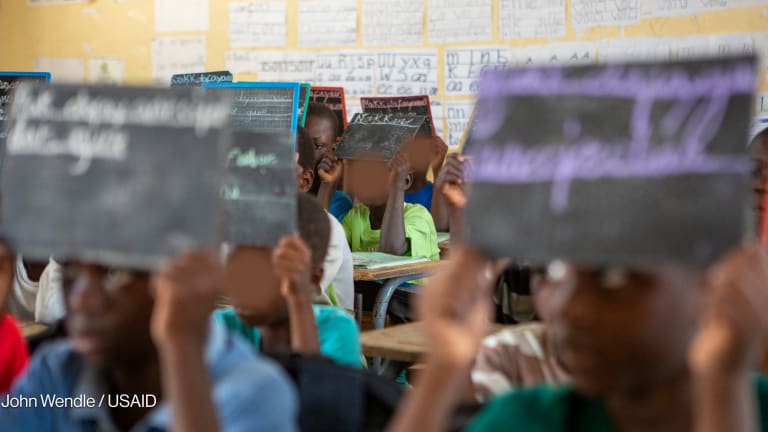
DUBAI — A new competition to identify the most promising ed tech startups capable of reaching a billion children with improved schooling has announced its first cohort of winners at the Global Education & Skills Forum in Dubai.
The winners include a language teaching company that only hires refugees, and an enterprise that condenses educational videos to make them cheaper and quicker to download for those with limited internet access.
The top three entrants to the inaugural “Next Billion EdTech Prize” — which offers $25,000 in prize money and the opportunity to pilot their technology in schools in South Africa — were announced on Sunday during the closing plenary of the forum, which was attended by some 3,000 education experts, technology developers, investors, and politicians over the weekend.
See more related topics:
► Minding the gaps at the Global Education & Skills Forum
► Could schools take a cue from the health force?
► 'Nobel prize for teaching' shines spotlight on innovative methods
Launched by the Varkey Foundation, the prize is designed to identify and help develop promising ventures with the potential to transform education in low-income and emerging economies. Founder Sunny Varkey said he wants the prize to “highlight technology’s potential to tackle the problems that have proven too difficult for successive generations of politicians to solve,” but said the ideas “must be hardy enough to improve education in regions where young people are denied access to a good quality teacher and a great learning environment.”
The prize comes as the World Bank describes a “learning crisis” in developing countries, with 264 million children out of school, and a further 600 million children in school but not learning basic skills such as reading and writing.
At the same time, technological advances are threatening to change the nature of many jobs, leaving experts concerned about a yawning skills gap unless education systems are drastically and rapidly reformed.
Forty startups battled it out over the weekend, pitching their ideas to a panel of judges made up of venture capitalists, philanthropic investors, ed tech experts, and education policymakers.
Devex spoke to the top three to find out more about their innovations and their potential to dent the education crisis in developing countries.
Chatterbox
The overall winner of the prize was London-based Chatterbox, an online language school founded by Afghan refugee Mursal Hedayat, which employs refugees as online and in-person language tutors, paying them a living wage. On the technology side, Chatterbox has an online booking system and video classrooms to connect tutors to learners around the world.
While a lot of attention is directed towards artificial intelligence and virtual reality, Hedayet said existing technologies are being underutilized in the ed tech space.
“There’s an open goal for taking technology that is not even controversial,” such as video chat, and “turning it into something really impactful by turning it onto problems like the refugee problem or education access,” Hedayet told Devex after finding out she had won the competition.
This realization, and growing up surrounded by highly-qualified Afghan refugees in London who were unable to use their skills, led to the creation of Chatterbox. Hedayet’s mother had worked as a civil engineer in Kabul, graduating as one of only five women on her program, before fleeing the country in the 1990s. She worked as a cleaner in the U.K., before retraining as a classroom language assistant.
Hedayet said she is actively looking for partnerships that will take Chatterbox’s recruitment “to areas of low economic opportunity for refugees,” and would match local living wage rates in those countries, saying “it would improve our business model and increase our impact.”
The humanitarian and development sectors could be a good source of business for Hedayet since Chatterbox’s staff are able to tutor in a wide range of local dialects and languages. The British Red Cross has already allocated 45,000 British pounds ($63,070) to the company to train its staff in Arabic.
“If you want to learn the Congolese dialect of French, there aren’t a lot of providers you can go to, so we’re finding a lot [of clients] coming to us where there is that gap in language learning,” she said, adding that the company would be happy to consider discounts for humanitarian workers and organizations.
The company, which was launched in 2016, is nearly self-sufficient, the founder said, having produced $100,000 in sales in its first year. But in order to grow, Hedayet said Chatterbox is looking to raise $350,000 to expand its three-person team, especially its marketing and sales capacity, which is currently working out of London. The enterprise was incubated at the University College London Institute of Education and launched with 15,000 British pounds in seed funding from impact-fund Bethnal Green Ventures.
Dot.learn
Another finalist, Dot Learn, can make online learning more accessible for people in developing countries working with slow or intermittent internet connections by compressing videos to make them easier, cheaper, and faster to download or watch online. In Kenya and Nigeria for example, this enables a student to watch five hours of educational videos for about the cost of sending a text message.
The company was co-founded by Tunde Alawode, who grew up in Lagos. Unhappy with the quality of education, he set about teaching himself by watching online classes at his local library. He was later accepted to the Massachusetts Institute of Technology, where he met co-founder Sam Bhattacharyya while taking a development ventures class at the MIT Media Lab.
Bhattacharyya, who was in Dubai to take part in the ed tech competition, told Devex he encountered the problem that dot.learn aims to address while teaching in a Mexican town as a Peace Corps volunteer.
“I was trying to show videos from Khan Academy but there wasn’t really the internet,” he said. When he met Alawode at MIT they started doing market research in Ghana and then Nigeria, and found out “the cost of internet was such an issue.” The two had learned about vector-based video while at college but hadn’t realized it could be a solution to this problem, Bhattacharyya said.
“We took that idea from a very theoretical and conceptual place and evolved it into an actual solution that is affecting actual students,” he explained.
Companies or students send dot.learn their videos, which they then compress and either send back to the user for a fee or publish them online, for which there is no charge. Currently it costs companies $1 per minute to use the private service.
In terms of partnering with NGOs and humanitarian organizations, Bhattacharyya said they are focused on the technology side and rely on partners to apply the approach, but added that there are huge applications for developing country settings.
TeachMeNow
Founder Thea Myhrvold describes her innovation as a “coordinating online platform” offering an Uber-style experience for online learning teachers and students. The Dubai-based innovator, who has worked for Amnesty International, came up with the idea while working as an online tutor, where she found herself looking for a platform — similar to Uber or AirBnB — to help her structure and manage her growing client list.
“We tend to think of online learning as knowledge and not a product,” she said. Finding nothing out there for her to use, she decided to set up her own “online marketplace.” The first class hosted by Teachmenow.com was between a Venezeulan professor, who was able to charge $36 for the session, and a female student from Saudi Arabia, she said.
Myhrvold also developed her own software to go with the site, so instead of switching to Skype or another platform to run the session, teachers and students login to the Teachmenow.com browser and use a web-based platform which includes the bookings and payments systems, as well as hosting the audio-visual chat, documents, and whiteboard-sharing, all in “one seamless experience,” she said.
The platform is sustainable because while teachers set the price for the lessons, Teachmenow.com takes a 20 percent commission. However, Myhrvold has already donated the software to SOS Children’s Villages, an NGO that works with abandoned children and hopes to use the platform to increase education access and quality around the world.
“My mission is to make learning accessible through technology; it’s about doing it in an efficient way that makes sense,” she said, adding that the platform can be “rebranded as a solution for schools and other institutions.”






